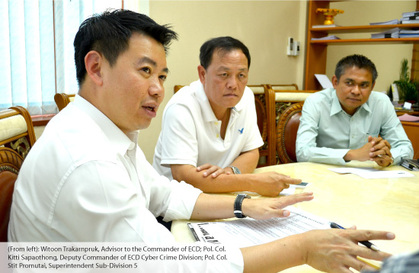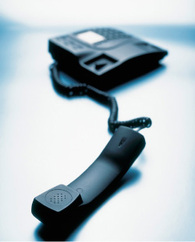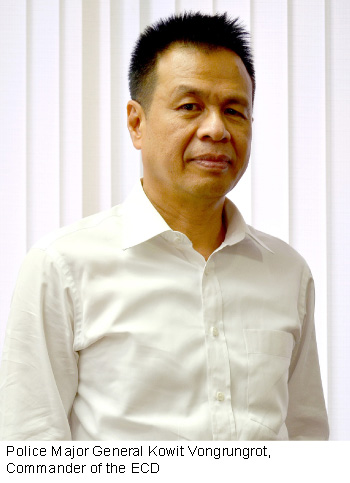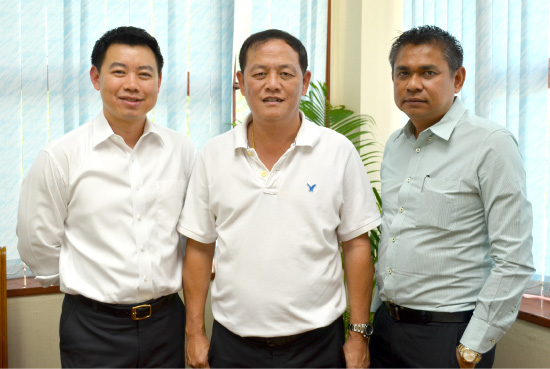| From credit card and banking frauds to dodgy call centers, lover’s games and investment sharks, the police have their hands full dealing with a growing number of scams By Maxmilian Wechsler SQUEEZED between modern high-rise office towers on busy North Sathorn Road in central Bangkok are two low-rise buildings that serve as headquarters of the frontline agency involved in the suppression of economic crimes throughout Thailand. It’s perhaps appropriate that the Economic Crime Suppression Division (ECD), under the Royal Thai Police, is situated in the hub of Bangkok’s financial center, among banks, insurance companies and other financial institutions. Most office workers and motorists driving past are probably unaware of its existence. But it is well known by street vendors selling counterfeit or pirated products in nearby Silom and Patpong or other parts of Bangkok who are arrested and brought here for booking. Police Major General Kowit Vongrungrot, the ECD commander since 2008, commands about 350 officers, both men and women, nationwide. He says, however, that with limited resources it is becoming increasingly difficult for his division to cope with economic crimes that are getting ever more complex, sophisticated and hi-tech. |

“The main responsibility of the ECD is the prevention, investigation and suppression of economic crimes throughout the country. We handle all kinds of economic crimes, including credit card, banking and tax frauds; intellectual property infringements and new types of economic crimes like call centre scams,” explains Maj-Gen Kowit.
To find out more about economic crimes committed by both locals and foreigners, I spoke to Witoon Trakarnpruk, an adviser to the commander, and two police colonels, Kitti Sapaothong and Stit Promutai. All are highly experienced in this type of work.
“Many people who commit crimes in their native countries escape to Thailand as it is a well-known tourist destination and open to everyone,” says Mr Witoon.”Some take advantage of this, assuming wrongly that they will be safe in conducting illegal business here. This applies to foreigners of many nationalities. For assistance, we work closely with a number of local and foreign law enforcement agencies.”
Credit card frauds and cash frauds are common due to criminals getting easier access to improving technology at lower costs. It’s low risk with high returns, often in a short period of time, said Mr Witoon, adding that counterfeit card and currency schemes are becoming more sophisticated and increasingly involve cross-border cooperation.
The major tourist destinations are still prime locations for credit card frauds. Other economic crimes like pyramid schemes flourish because people are greedy, he added.
To find out more about economic crimes committed by both locals and foreigners, I spoke to Witoon Trakarnpruk, an adviser to the commander, and two police colonels, Kitti Sapaothong and Stit Promutai. All are highly experienced in this type of work.
“Many people who commit crimes in their native countries escape to Thailand as it is a well-known tourist destination and open to everyone,” says Mr Witoon.”Some take advantage of this, assuming wrongly that they will be safe in conducting illegal business here. This applies to foreigners of many nationalities. For assistance, we work closely with a number of local and foreign law enforcement agencies.”
Credit card frauds and cash frauds are common due to criminals getting easier access to improving technology at lower costs. It’s low risk with high returns, often in a short period of time, said Mr Witoon, adding that counterfeit card and currency schemes are becoming more sophisticated and increasingly involve cross-border cooperation.
The major tourist destinations are still prime locations for credit card frauds. Other economic crimes like pyramid schemes flourish because people are greedy, he added.

Call center scams
Mr Witoon said call center scams which prey on gullible people are currently popular and explained in detail what they are all about: “This particular scam operates mainly in China, Taiwan and in Thailand. The syndicates usually involve Chinese groups who employ native speaking people to work in their call centers.
“Voice over Internet Protocol (VoIP), a computer-based telephone application, is used by the syndicates to call various destination countries to reach their victims. This saves costs and makes it difficult to trace the caller.
“Native Chinese or Thai speakers are engaged to chat with potential victims, and are divided into three groups or desks. Desk 1 obtains primary information from the victims before transferring them to Desk 2, who pose as police officers or Department of Special Investigation (DSI) officers and threaten the victim, saying their bank accounts have been linked to drug trafficking organizations, or someone had applied for a credit card under their name and run up debts.
“Finally the victim is transferred to Desk 3, where the scam is completed. They lead the victim to an ATM machine or bank counter to withdraw, transfer or deposit the funds into the syndicate’s ghost account. The call center employees receive a commission when their calls pay off, ranging from three to nine percent. As for the ghost accounts, the syndicate pays certain Thais to open these.
“The call center scam has been going on for only a few years. When it began the syndicate played on victims’ greed, telling them they had received a tax refund and needed to go to ATM machines and make transactions as instructed in order to obtain the tax refund. But actually they ended up transferring funds to the ghost accounts. At the ATM machine, victims were told to press the screen according to the syndicate’s instructions, in a quick manner. They were told they have to complete transactions within a limited timeframe, so they had little or no time to read the screen and be aware of what they were doing,” said Mr Witoon. He added that more recently the syndicate had changed to scare tactics, telling victims they had credit card debts or their accounts were linked to drug syndicates.
“The ECD and Chinese and Taiwanese police forces are working closely together and vigorously pursue call center syndicates,” Mr Witoon emphasized.
He also said that so far, no Westerners had become victims, simply because these syndicates will communicate in Chinese or Thai and not yet in English or any other language.
Col Kitti gave details of a major operation involving a call center scam. “With the collaboration of Chinese and Taiwanese police, we were able last May to smash a large syndicate operating in China and Thailand. They cheated citizens out of tens of millions of baht.
“I started to investigate the case early this year. We received information that a Thai-Chinese person from northern Thailand was working with the call center syndicates in China. I forwarded this and other information to the Chinese police. They found this man in Guangdong province of the People’s Republic of China and raided the call center there, resulting in the arrest of 12 individuals – 10 Thais, one Chinese and one Taiwanese national.
“The Chinese police confiscated many computers and other equipment, together with details on the victims the syndicate had called. These included Thai nationals in Thailand who had been taken for about 10 million baht.
“The syndicate set up a call center in China staffed with native Thais to call to Thailand and cheat Thais. They set up a call center here with their people calling to China to cheat Chinese people. That’s how they were operating.
“After we received all relevant information, evidence and exhibits from the Chinese police, they requested our cooperation in investigating the Chinese nationals who set up the call center in Thailand.
“We carried on the investigation and on May 8 raided five locations and arrested 100 people, including 64 Taiwanese and 26 people from mainland China, with the rest Burmese and Thai nationals,” Col Kitti stated.
Mr Witoon said call center scams which prey on gullible people are currently popular and explained in detail what they are all about: “This particular scam operates mainly in China, Taiwan and in Thailand. The syndicates usually involve Chinese groups who employ native speaking people to work in their call centers.
“Voice over Internet Protocol (VoIP), a computer-based telephone application, is used by the syndicates to call various destination countries to reach their victims. This saves costs and makes it difficult to trace the caller.
“Native Chinese or Thai speakers are engaged to chat with potential victims, and are divided into three groups or desks. Desk 1 obtains primary information from the victims before transferring them to Desk 2, who pose as police officers or Department of Special Investigation (DSI) officers and threaten the victim, saying their bank accounts have been linked to drug trafficking organizations, or someone had applied for a credit card under their name and run up debts.
“Finally the victim is transferred to Desk 3, where the scam is completed. They lead the victim to an ATM machine or bank counter to withdraw, transfer or deposit the funds into the syndicate’s ghost account. The call center employees receive a commission when their calls pay off, ranging from three to nine percent. As for the ghost accounts, the syndicate pays certain Thais to open these.
“The call center scam has been going on for only a few years. When it began the syndicate played on victims’ greed, telling them they had received a tax refund and needed to go to ATM machines and make transactions as instructed in order to obtain the tax refund. But actually they ended up transferring funds to the ghost accounts. At the ATM machine, victims were told to press the screen according to the syndicate’s instructions, in a quick manner. They were told they have to complete transactions within a limited timeframe, so they had little or no time to read the screen and be aware of what they were doing,” said Mr Witoon. He added that more recently the syndicate had changed to scare tactics, telling victims they had credit card debts or their accounts were linked to drug syndicates.
“The ECD and Chinese and Taiwanese police forces are working closely together and vigorously pursue call center syndicates,” Mr Witoon emphasized.
He also said that so far, no Westerners had become victims, simply because these syndicates will communicate in Chinese or Thai and not yet in English or any other language.
Col Kitti gave details of a major operation involving a call center scam. “With the collaboration of Chinese and Taiwanese police, we were able last May to smash a large syndicate operating in China and Thailand. They cheated citizens out of tens of millions of baht.
“I started to investigate the case early this year. We received information that a Thai-Chinese person from northern Thailand was working with the call center syndicates in China. I forwarded this and other information to the Chinese police. They found this man in Guangdong province of the People’s Republic of China and raided the call center there, resulting in the arrest of 12 individuals – 10 Thais, one Chinese and one Taiwanese national.
“The Chinese police confiscated many computers and other equipment, together with details on the victims the syndicate had called. These included Thai nationals in Thailand who had been taken for about 10 million baht.
“The syndicate set up a call center in China staffed with native Thais to call to Thailand and cheat Thais. They set up a call center here with their people calling to China to cheat Chinese people. That’s how they were operating.
“After we received all relevant information, evidence and exhibits from the Chinese police, they requested our cooperation in investigating the Chinese nationals who set up the call center in Thailand.
“We carried on the investigation and on May 8 raided five locations and arrested 100 people, including 64 Taiwanese and 26 people from mainland China, with the rest Burmese and Thai nationals,” Col Kitti stated.

Foreign financial advisors walk a fine line
What about foreigners operating as “financial advisers” and offering excessively high returns on investment?
“In general,” said Col Stit, “foreigners can operate a business in Thailand provided they register it according to the Thai laws with the Ministry of Commerce. However, there are certain categories of business foreigners aren’t permitted to engage in and it is the ministry who controls the nature of the business. We have to consider whether the business they are doing is legal or otherwise.”
What about foreigners operating as “financial advisers” and offering excessively high returns on investment?
“In general,” said Col Stit, “foreigners can operate a business in Thailand provided they register it according to the Thai laws with the Ministry of Commerce. However, there are certain categories of business foreigners aren’t permitted to engage in and it is the ministry who controls the nature of the business. We have to consider whether the business they are doing is legal or otherwise.”

Other foreign scams
Col Kitti said that the most common economic crimes committed by foreigners in Thailand are the call center scams, followed by credit card fraud with counterfeit cards or “white plastic.” The third most common is the operation of “boiler rooms,” where callers try to solicit foreigners over the phone into investments such as buying shares in overseas markets or gold futures markets in Asia. “This is a total fraud,” he said.
“Another scam is an email fraud called in neighboring countries the ‘‘lover game.” This scam is perpetrated mainly by Africans. They will send an email to a woman saying they are in love with her. Soon they will tell her they need money for some investment or some advance fee, and ask her to transfer money to their account. They used to operate this scam from Thailand but now they have moved to some neighbouring countries. The reason they moved is that we traced their transactions and we found out when they withdrew the money.
“The criminals found the ladies by two methods – either through match-making websites, or by sending emails to hundreds of people and waiting to see who responds,” Col Stit said, adding that this is known as “phishing.”
“Another economic crime is illegal money transfer to another country without going through proper channels. Strictly speaking, this is not money laundering by its nature, but it has similarities to money laundering.”
Mr Witoon said that in the past, all economic crimes were handled by the ECD, but a separate division called Technology Crime Suppression Division (TCSD) has just been set up to handle crimes related to technology. These include computer hacking, phishing emails, pornographic distribution over the internet, etc. Illegal money transfers are still handled by the ECD. The TCSD is headquartered in a facility on Chaeng Wattana Road (www.tcsd.in.th).
Col Kitti said that the most common economic crimes committed by foreigners in Thailand are the call center scams, followed by credit card fraud with counterfeit cards or “white plastic.” The third most common is the operation of “boiler rooms,” where callers try to solicit foreigners over the phone into investments such as buying shares in overseas markets or gold futures markets in Asia. “This is a total fraud,” he said.
“Another scam is an email fraud called in neighboring countries the ‘‘lover game.” This scam is perpetrated mainly by Africans. They will send an email to a woman saying they are in love with her. Soon they will tell her they need money for some investment or some advance fee, and ask her to transfer money to their account. They used to operate this scam from Thailand but now they have moved to some neighbouring countries. The reason they moved is that we traced their transactions and we found out when they withdrew the money.
“The criminals found the ladies by two methods – either through match-making websites, or by sending emails to hundreds of people and waiting to see who responds,” Col Stit said, adding that this is known as “phishing.”
“Another economic crime is illegal money transfer to another country without going through proper channels. Strictly speaking, this is not money laundering by its nature, but it has similarities to money laundering.”
Mr Witoon said that in the past, all economic crimes were handled by the ECD, but a separate division called Technology Crime Suppression Division (TCSD) has just been set up to handle crimes related to technology. These include computer hacking, phishing emails, pornographic distribution over the internet, etc. Illegal money transfers are still handled by the ECD. The TCSD is headquartered in a facility on Chaeng Wattana Road (www.tcsd.in.th).

IP violations
Concerning intellectual property (IP) violations, Col Kitti said: “Despite hundreds of arrests, the counterfeiters and pirates continue the business because it offers low risk and high profits. The punishments are mild and the laws haven’t changed for a long time.
“However, now the government is pushing for landlord punishment, meaning the plaza owner or landlord will be jointly responsible with the offender. We hope that when the law is passed it will improve the situation.
“Another problem we have is that when the police make arrests, most of the cases will be settled out of court between the wrongdoer and the rights owner. The IP law allows compromise because it is not a criminal law. They can talk to each other and settle the case and the suit is withdrawn. As long as this is the common practice, the wrongdoers will never stop,” said Col Kitti.
The Colonel also pointed out that if the sellers of pirated CDs, VCDs or DVDs display only the cover without the disk, no one can arrest them unless the cover has an obscene picture on it.
“In comparison to the same period of last year, we had a 20 per cent increase in the number of IP arrests and cases prosecuted. This won’t solve the problem because the number of selling points never went down. Therefore, we have to reassess the best approach to the problem. We must make consumers aware of the benefits of buying genuine and legal products,” Col Kitti said.
Concerning intellectual property (IP) violations, Col Kitti said: “Despite hundreds of arrests, the counterfeiters and pirates continue the business because it offers low risk and high profits. The punishments are mild and the laws haven’t changed for a long time.
“However, now the government is pushing for landlord punishment, meaning the plaza owner or landlord will be jointly responsible with the offender. We hope that when the law is passed it will improve the situation.
“Another problem we have is that when the police make arrests, most of the cases will be settled out of court between the wrongdoer and the rights owner. The IP law allows compromise because it is not a criminal law. They can talk to each other and settle the case and the suit is withdrawn. As long as this is the common practice, the wrongdoers will never stop,” said Col Kitti.
The Colonel also pointed out that if the sellers of pirated CDs, VCDs or DVDs display only the cover without the disk, no one can arrest them unless the cover has an obscene picture on it.
“In comparison to the same period of last year, we had a 20 per cent increase in the number of IP arrests and cases prosecuted. This won’t solve the problem because the number of selling points never went down. Therefore, we have to reassess the best approach to the problem. We must make consumers aware of the benefits of buying genuine and legal products,” Col Kitti said.

Dealing with informants
Informants are sometimes needed to initiate an investigation. “Before we accept an informant, we have to know in what ‘category’ he or she is,” says Mr Witoon. “We have to know the reason they offer their services to us, in order to know how to handle them. Many people come to us with information, but we have to evaluate every individual before accepting their services.
“We categorize informants into several groups, including those who want to sell the information, businessmen who want to take out competitors, or someone, perhaps an employee, looking for revenge.”
Mr Witoon has a warning for potential victims. “Be conscious, and watch out for anything ‘too good to be true.’ ”
Informants are sometimes needed to initiate an investigation. “Before we accept an informant, we have to know in what ‘category’ he or she is,” says Mr Witoon. “We have to know the reason they offer their services to us, in order to know how to handle them. Many people come to us with information, but we have to evaluate every individual before accepting their services.
“We categorize informants into several groups, including those who want to sell the information, businessmen who want to take out competitors, or someone, perhaps an employee, looking for revenge.”
Mr Witoon has a warning for potential victims. “Be conscious, and watch out for anything ‘too good to be true.’ ”



 RSS Feed
RSS Feed
















